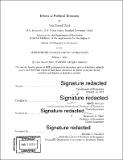| dc.contributor.advisor | Abhijit Banerjee and Benjamin A. Olken. | en_US |
| dc.contributor.author | Reid, Otis Russell | en_US |
| dc.contributor.other | Massachusetts Institute of Technology. Department of Economics. | en_US |
| dc.date.accessioned | 2018-08-08T19:49:04Z | |
| dc.date.available | 2018-08-08T19:49:04Z | |
| dc.date.copyright | 2018 | en_US |
| dc.date.issued | 2018 | en_US |
| dc.identifier.uri | http://hdl.handle.net/1721.1/117317 | |
| dc.description | Thesis: Ph. D., Massachusetts Institute of Technology, Department of Economics, 2018. | en_US |
| dc.description | Cataloged from PDF version of thesis. | en_US |
| dc.description | Includes bibliographical references (pages 179-184). | en_US |
| dc.description.abstract | This thesis consists of three chapters on political economy. Each chapter explores the effects of a change to the equilibrium of a given market. In the first chapter, Jon Weigel and I study a randomized controlled trial in the Democratic Republic of the Congo on corruption at tolls. We randomly vary incentives for drivers to comply with rules instead of engaging in corruption. These incentives affect the "supply" of corruption rather than the "demand" for corruption from bureaucrats. We find that sizable financial incentives produce a 7 to 10 percentage point increase in the probability that drivers get receipts, implying an elasticity of citizen supply of bribes ranging from 0.45 to -0.95. Social incentives have no effect. Similarly, providing information about other drivers' responses to treatment (to shift social norms) does not affect behavior. Drivers' appear remarkably inelastic in their supply of bribes. We argue this reflects the fact that bribe payment may increase the efficiency of transactions in the toll setting we examine and suggest that corruption may serve to "grease the wheels" in this context. In the second chapter, Christopher Blattman, Horacio Larreguy, Benjamin Marx, and I study a large-scale randomized controlled trial designed to combat vote-buying in the 2016 election in Uganda. We find that the campaign did not reduce the extent to which voters accepted cash and gifts in exchange for their votes. In addition, we designed the study to take advantage of our large sample (covering 1.2 million voters) to examine both direct treatment and spillover effects. The spillover effects on vote-buying are also zero, but the campaign had large direct and indirect effects on vote-shares for candidates. Heavily treated areas had increases in visits from non-incumbent candidates and non-incumbent candidates improved their vote shares substantially in these parishes. Consistent with these effects, we find evidence that the campaign diminished the effectiveness of vote-buying transactions by shifting local social norms against vote-selling and by convincing some voters to vote their conscience, regardless of any gifts received. In the third chapter, I examine the effect of the 26th Amendment, which lowered the voting age in the United States from 21 to 18. This change enfranchised a large population of new voters, expanding the electorate by almost 9%. However, I find that the Amendment had little effect on overall political outcomes in the United States. Although it did increase total turnout in areas with more young voters, it did not affect the partisan composition of the electorate and correspondingly did not lead to changes in representation or policy. These results stand in contrast to other well-studied expansions of the franchise and provide an important caveat to those findings: when the preferences of new voters are insufficiently distinct from those of existing voters, politicians have little reason to change their established positions. | en_US |
| dc.description.statementofresponsibility | by Otis Russell Reid. | en_US |
| dc.description.tableofcontents | Citizen participation in corruption : evidence from roadway tolls in the Democratic Republic of the Congo (with Jonathan Weigel) -- A market equilibrium approach to reduce the incidence of vote -buying : evidence from Uganda (with Christopher Blattman, Horacio Larreguy, and Benjamin Marx) -- A "minor" expansion : political outcomes. | en_US |
| dc.format.extent | 184 pages | en_US |
| dc.language.iso | eng | en_US |
| dc.publisher | Massachusetts Institute of Technology | en_US |
| dc.rights | MIT theses are protected by copyright. They may be viewed, downloaded, or printed from this source but further reproduction or distribution in any format is prohibited without written permission. | en_US |
| dc.rights.uri | http://dspace.mit.edu/handle/1721.1/7582 | en_US |
| dc.subject | Economics. | en_US |
| dc.title | Essays in political economy | en_US |
| dc.type | Thesis | en_US |
| dc.description.degree | Ph. D. | en_US |
| dc.contributor.department | Massachusetts Institute of Technology. Department of Economics | |
| dc.identifier.oclc | 1046086465 | en_US |
